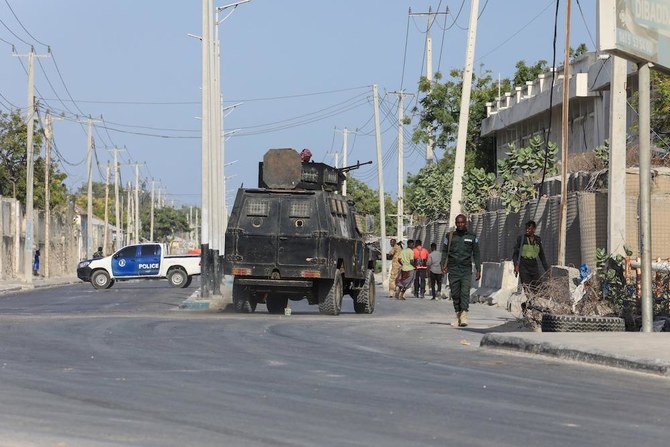MOGADISHU: Fighters from Somalia’s Al-Shabab insurgent group attacked a military base on the outskirts of a town in the center of the country, leading to at least 17 deaths, a resident said.
The attack on Masagawa, about 300 kilometers north of Mogadishu, came days after Al-Shabab attacked a base housing Ugandan forces from an African Union peacekeeping mission in Bulamarer, 130km southwest of the capital.
“I have seen 17 dead people including the attackers and the attacked. The fighting has moved into the forest. The town is calm now and under government control,” Hussein Nur, a resident of Masagawa, said by phone.
Captain Abdullahi Mohamed, a military officer in Masagawa, confirmed the attack and said 12 Al-Shabab fighters had died, but he did not know how many troops were dead.
“Fierce fighting went on for hours on the edge of the town. So far, I know we lost soldiers but I have no exact figure. We repulsed Al-Shabab and now we are pursuing them in the forest,” Mohamed said.
The Somalia National Army said on Twitter it had prevented an attack on the town itself, and killed Al-Shabab fighters, but did not say how many.
Al Qaeda-linked Al-Shabab has been fighting since 2006 to topple Somalia’s central government and establish its own rule based on its strict interpretation of Islamic Sharia law.
It has launched significant attacks against hotels, military bases and government establishments in despite a relatively successful government push back.
The group said in a statement it had killed 73 soldiers in the attack, targeting those who had returned from training in Eritrea.
Al Shabab tends to give casualty figures in attacks that differ from those issued by the authorities.
Clash between Somalia army and Al-Shabab kills 17, witness says
https://arab.news/pygd8
Clash between Somalia army and Al-Shabab kills 17, witness says

- Insurgent group attacks a military base on the outskirts of a town in the center of the country
- Al-Qaeda-linked Al-Shabab has been fighting since 2006 to topple Somalia’s central government
French publisher recalls dictionary over ‘Jewish settler’ reference

- The entry in French reads: “In October 2023, following the death of more than 1,200 Jewish settlers in a series of Hamas attacks”
- The four books are subject to a recall procedure and will be destroyed, Hachette said
PARSI: French publisher Hachette on Friday said it had recalled a dictionary that described the Israeli victims of the October 7, 2023 attacks as “Jewish settlers” and promised to review all its textbooks and educational materials.
The Larousse dictionary for 11- to 15-year-old students contained the same phrase as that discovered by an anti-racism body in three revision books, the company told AFP.
The entry in French reads: “In October 2023, following the death of more than 1,200 Jewish settlers in a series of Hamas attacks, Israel decided to tighten its economic blockade and invade a large part of the Gaza Strip, triggering a major humanitarian crisis in the region.”
The worst attack in Israeli history saw militants from the Palestinian Islamist group kill around 1,200 people in settlements close to the Gaza Strip and at a music festival.
“Jewish settlers” is a term used to describe Israelis living on illegally occupied Palestinian land.
The four books, which were immediately withdrawn from sale, are subject to a recall procedure and will be destroyed, Hachette said, promising a “thorough review of its textbooks, educational materials and dictionaries.”
France’s leading publishing group, which came under the control of the ultra-conservative Vincent Bollore at the end of 2023, has begun an internal inquiry “to determine how such an error was made.”
It promised to put in place “a new, strengthened verification process for all its future publications” in these series.
President Emmanuel Macron on Wednesday said that it was “intolerable” that the revision books for the French school leavers’ exam, the baccalaureat, “falsify the facts” about the “terrorist and antisemitic attacks by Hamas.”
“Revisionism has no place in the Republic,” he wrote on X.
Hamas’s October 7, 2023 attack on Israel resulted in the deaths of 1,221 people, with 251 people taken hostage, according to an AFP tally based on official Israeli figures.
Authorities in Gaza estimate that more than 70,000 people have been killed by Israeli forces during their bombardment of the territory since, while nearly 80 percent of buildings have been destroyed or damaged, according to UN data.
Israeli forces have killed at least 447 Palestinians in Gaza since a ceasefire took effect in October, according to the Hamas-run health ministry.














